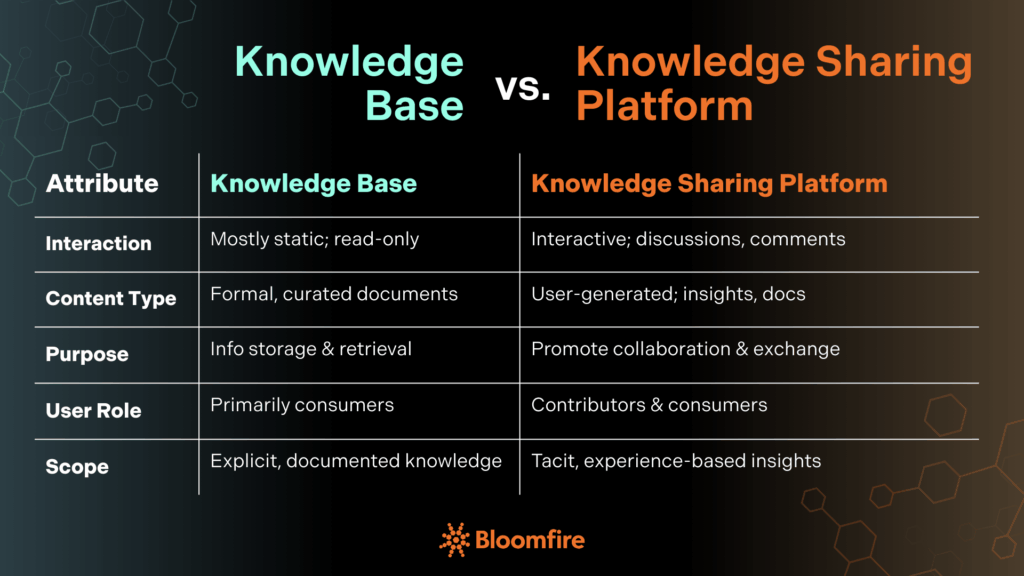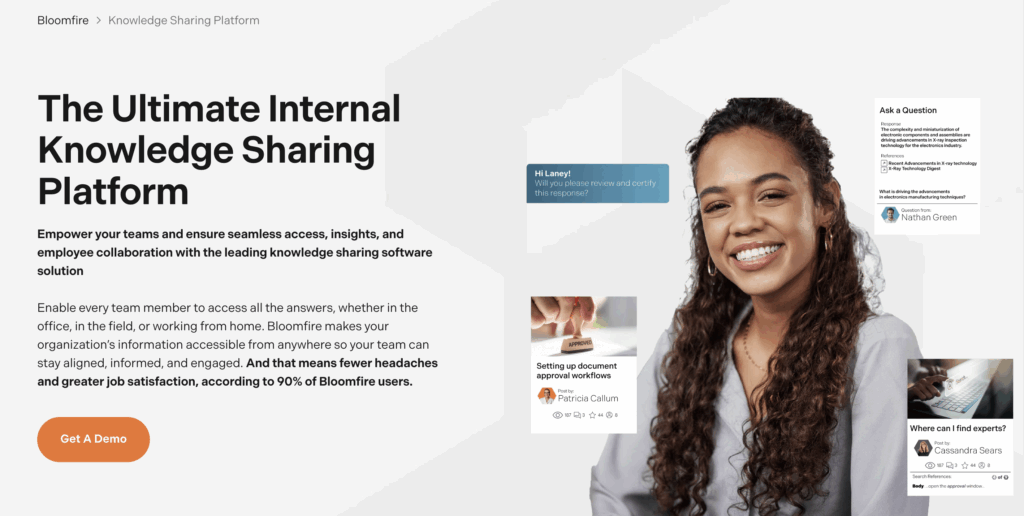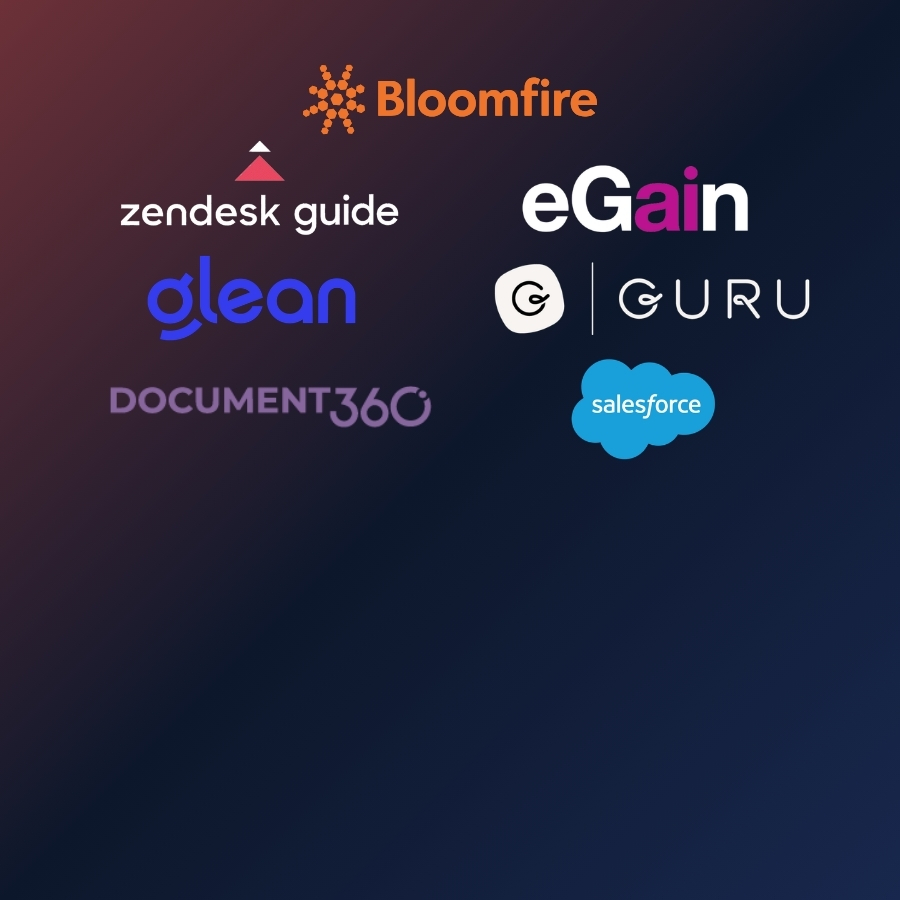Knowledge Sharing Platform Vs. Knowledge Base: What’s the Difference?

Quick Definitions
Knowledge Base: A digital repository for company information. It can be internal (for employees only) or external (customer-facing).
Knowledge Sharing Platform: A software system that extends the functionality of a knowledge base with features such as multiple file formats (including video), deep search within content, a Q&A engine, and social interactions to keep knowledge current, trustworthy, and quickly findable.
The terms knowledge base and knowledge sharing platform are often used interchangeably, but there are some important distinctions. While both aim to centralize information, a knowledge base primarily serves as a repository of organized data, whereas a knowledge sharing platform emphasizes collaboration and the active exchange of information among users.
If you’re looking for a new knowledge management solution for your company, you must learn the differences between a knowledge base vs. knowledge sharing platform.
Let’s get right into it.
Key Differences Between Knowledge Sharing Platforms and Knowledge Bases
Although seemingly similar to central hubs for information, knowledge sharing platforms and knowledge bases are built with distinct purposes that shape how they are used and the value they provide. Understanding these underlying intentions is key to leveraging their full potential. Keep in mind that each serves a unique role in how information is accessed, created, and disseminated within an organization or community.
In dissecting the discussion on knowledge sharing platform vs. knowledge base, here are the key differences you need to know.

- Interaction level: Knowledge sharing platforms are inherently interactive, fostering engagement through features such as discussions, comments, and real-time updates. Conversely, knowledge bases are largely static, offering information for consumption without direct user interaction beyond searching and reading.
- Content type: Knowledge sharing platforms are rich in user-generated content, encompassing personal experiences, insights, and collaborative documents. In contrast, knowledge bases typically house formalized, highly structured documents that are meticulously curated to ensure accuracy and consistency.
- Purpose: The core purpose of a knowledge sharing platform is to promote collaboration and the free exchange of ideas, fostering a community of shared learning. A knowledge base, on the other hand, is built for efficient information storage and retrieval, serving as a reliable reference point for facts and procedures.
- User role: On a knowledge sharing platform, users are often both contributors and consumers of information, actively participating in its creation and refinement. Within a knowledge base, users are primarily consumers, accessing pre-defined information.
- Scope: Knowledge sharing platforms often capture tacit knowledge—unwritten, experience-based insights—through discussions and interactions. Knowledge bases tend to focus on explicit knowledge, which is documented and formalized.
Both platforms aim to centralize information and make it accessible to a target audience. They both contribute to organizational learning and can reduce redundant efforts by providing readily available answers. Nonetheless, both serve to improve decision-making and efficiency within an organization or community.
What Is a Knowledge Base?
A knowledge base is a tool that helps organize information by putting your company’s content in one central place. Think of it like a digital library: users can visit the knowledge base to find the specific content they need without having to ask a coworker or dig through old Slack and email threads.
Internal knowledge base vs. external knowledge base
A knowledge base can be internal, external, or both. Companies often utilize internal knowledge bases to provide employees with a centralized location to find answers to specific on-the-job questions.
For example, if a new customer service representative is on the phone with a customer inquiring about the company’s return policy, the representative could search the internal knowledge base for return policy information to share. Or if a sales rep is wondering if there’s any collateral they can share with a prospect about a new product feature, they can search the knowledge base to see if the marketing team has created that collateral.
Companies utilize external knowledge bases to provide customers with an online resource center that offers answers to common, easily resolved questions. Customers prefer to use self-service channels when they have a question, with over 80 percent of customers preferring self-service options like FAQs on a company’s website to find information.
An external knowledge base provides customers with a frictionless way to find answers, reducing the number of calls customer service representatives receive and allowing them to focus on addressing more complex issues.
Your Smart Knowledge Solution Awaits
Centralize information and empower your team with Bloomfire’s intuitive platform.
Explore Bloomfire
Knowledge Base Advantages
Implementing a knowledge base unlocks a cascade of benefits, streamlining processes and empowering your team with readily accessible information. From boosting daily efficiency to fostering a more independent workforce, the advantages extend across various facets of your business.
Here are the key advantages of a knowledge base.
- Efficiency: A well-organized knowledge base empowers users to quickly find the information they need. This swift access to solutions reduces downtime and significantly enhances overall productivity across the organization.
- Consistency: Centralizing information within a knowledge base ensures that everyone has access to the exact same data. This uniformity maintains a high level of consistency in operations and decision-making throughout your organization.
- Self-service support: Users can independently find answers to common questions, eliminating the need to contact support staff. This capability significantly decreases the workload on your customer service and IT teams, allowing them to focus on more complex issues.
- Training and onboarding: A comprehensive knowledge base acts as an invaluable training resource for new employees. It provides them with essential information about their roles, company policies, and processes, accelerating their integration into the team.
These powerful advantages collectively make a knowledge base like Bloomfire an indispensable tool for cultivating an organized, informed, and highly efficient information management system. Its integration empowers employees, improves service delivery, and drives better outcomes for the entire organization.
Organizations leveraging knowledge bases observe a notable 23% drop in customer support tickets. This efficiency extends to operations, where self-service portals contribute to a 25% increase in operational efficiency.
Knowledge Base Limitations
While there’s a lot to love about knowledge bases, there are some limitations to traditional knowledge base systems. Data decay, which partly stems from outdated knowledge base articles, can impact customer satisfaction and operational efficiency. This highlights a critical need for solutions that offer more dynamic and responsive knowledge management.
- Limited Q&A and community interaction: Many lack a dedicated question-and-answer component, restricting users to pre-posted answers from administrators. This forces users to seek information elsewhere if their specific queries aren’t covered, hindering community-driven knowledge exchange.
- Challenging folder structures: The reliance on complex folder structures can make finding information difficult, especially if users are unfamiliar with the system’s underlying organizational logic. This can lead to frustration and inefficient information retrieval.
- Restricted search functionality: Traditional knowledge bases often feature limited search capabilities. While basic navigation and keyword searches for file names might be available, users often cannot search for specific words or phrases within documents or multimedia content like videos, making deep dives for information challenging.
- Inflexible roles and permissions: Many systems offer rigid role and permission structures, typically allowing only administrators to upload and edit content while other users are restricted to viewing. This limits broader participation and content contribution from across the organization.
- Lack of collaboration and feedback: Most traditional knowledge bases do not support commenting on or sharing content directly within the platform. This creates a one-way flow of information, preventing content creators from receiving valuable feedback necessary for improving and refining their materials.
A highly effective approach to overcoming these challenges lies in selecting a solution that seamlessly integrates the structured benefits of a knowledge base with the dynamic, collaborative features of a knowledge sharing platform. This dual functionality offers the best of both worlds: organized information retrieval, critical for efficiency, combined with interactive elements that foster vibrant engagement and continuous knowledge creation.
Opting for a platform that serves both functions allows your organization to build a comprehensive and resilient knowledge ecosystem. Bloomfire exemplifies this powerful combination.
Through Bloomfire’s Knowledge Base, you can access a robust KM framework that combines the benefits of a traditional knowledge base with collaborative tools, ensuring information is organized and easily searchable while fostering user contribution and interaction.
What Is a Knowledge Sharing Platform?
A knowledge sharing platform is a software system that contains a knowledge base, as well as modern features that encourage users to exchange information in real time. Like traditional knowledge bases, knowledge sharing platforms can be either internal or external-facing.
One differentiating feature of Bloomfire’s knowledge sharing platform is its Q&A engine. This tool allows users from across the company (or customers if the platform is external-facing) to post questions and get published responses from subject matter experts. Questions and answers are deeply indexed within the knowledge sharing platform, allowing other users to search for them using keywords and avoid asking the same question. Over time, companies can develop a comprehensive collection of questions and answers.
Many knowledge sharing platforms also allow users across all levels of an organization to share content and comment on posts (depending on the permissions established by their administrators). This helps democratize knowledge across companies, as all employees have the opportunity to provide input and share their expertise, regardless of department or seniority.
For example, new hires might comment on training materials, telling leadership what they think worked well and what was unclear. Leadership could then use this feedback to make improvements to their onboarding process.
Knowledge Sharing Platform Advantages
Knowledge sharing platforms offer several advantages that can transform the way your organization operates, moving beyond traditional information storage to foster dynamic interaction and promote continuous growth. These platforms aren’t just about housing information; they’re about cultivating an environment where ideas flow freely.
Check out the standout advantages of using a knowledge sharing platform.
- Enhanced collaboration: These platforms facilitate real-time communication, enabling team members to collaborate across different locations and time zones seamlessly. This breaks down silos and encourages a more unified approach to projects and problem-solving.
- Knowledge retention: Documenting discussions and insights helps retain valuable organizational knowledge that can be accessed by future employees. This prevents the loss of crucial information when employees leave or transition roles, ensuring that hard-earned wisdom remains within the organization.
- Increased engagement: Interactive features like polls, forums, and Q&A sessions foster employee engagement, encouraging them to participate in discussions and share their expertise actively. This not only makes employees feel more valued but also taps into a wider pool of internal knowledge.
- Agility: The ability to quickly disseminate information and gather feedback enables organizations to respond swiftly to changes and challenges. This responsiveness is crucial in today’s fast-paced business environment, allowing for rapid adaptation and decision-making.
Implementing a knowledge sharing platform like Bloomfire can empower your teams, streamline operations, and build a more resilient and knowledgeable workforce prepared for future challenges. It’s an investment in a future where Enterprise Intelligence drives progress, making your organization more adaptive and innovative.
It becomes especially vital, as a McKinsey Global Institute Report underscores, with intuitive knowledge management systems capable of cutting information search time by up to 35% and boosting organization-wide productivity by a significant 20-25%.
Knowledge Sharing Platform Limitations
Knowledge sharing platforms, while invaluable for fostering collaboration and disseminating information, are not without their inherent challenges. These limitations, if not addressed proactively, can hinder the benefits these platforms aim to deliver.
- Information overload: The continuous influx of discussions, documents, and updates on a knowledge sharing platform can quickly lead to an overwhelming volume of information. This can lead to a “needle in a haystack” scenario, where valuable insights are buried beneath a mountain of less pertinent data.
- Lack of structure: Knowledge sharing platforms frequently prioritize fluid discussions and user-generated content. This can result in a less formalized structure, making it difficult to systematically categorize, search for, and retrieve information over time.
- Security concerns: When sensitive or proprietary information is shared, there are risks of unauthorized access, data breaches, or accidental disclosure. Robust security protocols, including access controls, encryption, and regular audits, become paramount to safeguard organizational data and maintain confidentiality.
- Dependence on user engagement: If users are not motivated to contribute, share, and interact, the platform can quickly become stagnant. A lack of consistent engagement means less new content, fewer discussions, and ultimately, a diminishing return on the investment made in the platform.
The strategic choice of the right platform, coupled with proactive implementation strategies, can transform these apparent limitations into opportunities. When an organization selects a platform designed with these challenges in mind, it can significantly mitigate risks and maximize the inherent benefits of collective intelligence.
Consider Bloomfire, for instance, a viable platform that offers features designed to address some of these common pitfalls. It tackles information overload through its robust, AI-powered search functionality, which helps users quickly pinpoint relevant content even amidst large volumes of data.

Bloomfire’s emphasis on content categorization, tagging, and moderation tools helps bring structure to user-generated insights. Information becomes more discoverable, reducing the feeling of disorganization. It also incorporates significant security measures, including data encryption and compliance features, to safeguard sensitive organizational information.
Furthermore, its intuitive interface and collaborative features are designed to encourage active user participation. These make it easier to sustain engagement and ensure the platform remains a dynamic hub for shared knowledge.
Frequently Asked Questions
What are knowledge sharing platform examples?
Bloomfire stands out as a prominent example of a knowledge sharing platform that also functions as a robust knowledge base. Other notable options include Guru, Confluence, and Document360, each offering distinct features tailored to meet diverse organizational needs.
What is an organizational knowledge base?
An organizational knowledge base serves as a central, structured repository for an enterprise’s collective intelligence. This unified resource enables employees across departments to quickly access accurate and up-to-date information, promoting self-sufficiency, enhancing decision-making, and improving overall operational efficiency.
Can a knowledge base and a knowledge sharing platform coexist within an organization?
Yes, a knowledge base and a knowledge sharing platform can coexist and even thrive together within an organization. Many modern solutions, such as Bloomfire, are designed to integrate the structured information storage of a knowledge base with the dynamic features of a knowledge sharing platform. You can maintain a single source of truth for official documentation while simultaneously fostering real-time discussions and cross-functional expertise exchange.
Choosing a Knowledge Base vs. Knowledge Sharing Platform
While a traditional knowledge base suffices for basic information storage, a knowledge sharing platform is essential if your company deals with high volumes of content requiring rapid search and aims to foster employee or customer engagement and contributions.
Bloomfire excels as a comprehensive solution, uniquely serving as both a robust knowledge base and a dynamic knowledge sharing platform. It effectively addresses common limitations with advanced tools and a robust knowledge management framework, ensuring organized, searchable information while simultaneously promoting active participation and collaborative content creation.
Optimize Knowledge Exchange
Empower your organization with seamless knowledge sharing
Talk to an Expert

How to Improve Customer Service: 9 Strategies to Automate Success

7 Best Customer Service Knowledge Management Systems in 2026

The 6 Knowledge Management Trends That Redefine Strategic Intelligence in 2026

Estimate the Value of Your Knowledge Assets
Use this calculator to see how enterprise intelligence can impact your bottom line. Choose areas of focus, and see tailored calculations that will give you a tangible ROI.

Take a self guided Tour
See Bloomfire in action across several potential configurations. Imagine the potential of your team when they stop searching and start finding critical knowledge.